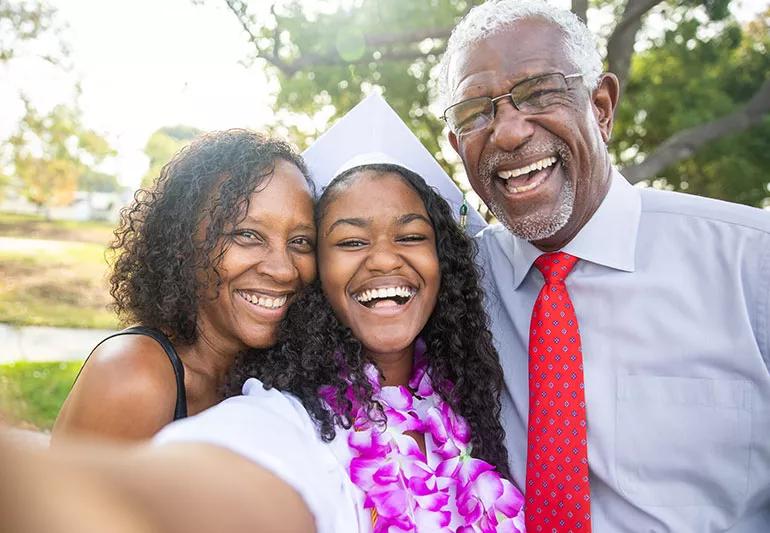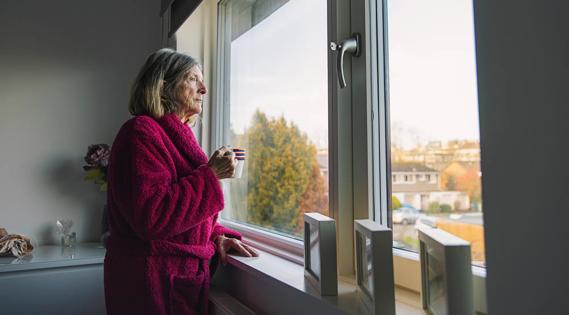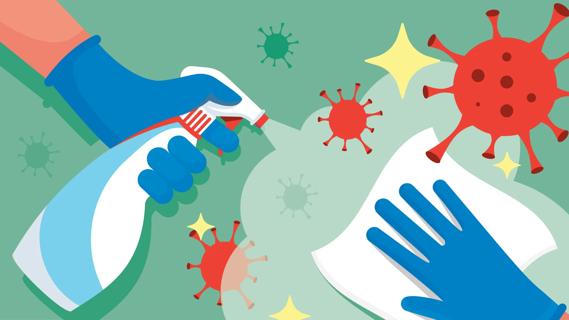Advertisement
Keep all your guests safe this summer

The class of 2021 is wrapping up a momentous occasion: graduation. And such an occasion after this past year deserves a celebration like no other! With more and more people vaccinated against COVID-19, you might be ready to party like never before. But how do you celebrate this rite of passage responsibly during a global pandemic? And is it OK to gather to celebrate your senior?
Advertisement
Cleveland Clinic is a non-profit academic medical center. Advertising on our site helps support our mission. We do not endorse non-Cleveland Clinic products or services. Policy
We asked infectious disease specialist Kristin Englund, MD, about the biggest things to consider as we head into graduation season, and how to have (or attend) graduations and grad parties safely.
“One of the most important ways to keep yourself protected when you’re going to or hosting a graduation party is to get yourself vaccinated,” she says. “Make sure you’ve afforded yourself the best protection so you can have the most fun when you’re helping your family and loved ones celebrate.”
But with only 58.9% of the U.S. population fully vaccinated, a good number of the people you know probably still haven’t received their vaccination against COVID-19 for any number of reasons. So how can you attend or host a graduation event or party while remaining mindful of the ever-changing guidelines for keeping everyone safe?
Dr. Englund said it’s important to consider having a venue outside.
“We know that if you’re having a party that is outdoors, especially for a small number of people, that’s going to be the best way to try to keep those who are unvaccinated safe.”
The Centers for Disease Control (CDC) just updated its guidelines regarding masking up in public settings, and Dr. Englund says according to the new guidelines, if you’ve been vaccinated it’s OK to ditch the mask. Be mindful to note local and state mandates, as those rules still apply.
Advertisement
But if it’s an indoor event and you’re not vaccinated, you should wear a mask. “An indoor party means those who are unvaccinated need to wear masks indoors.”
If you’ve been tapped to plan a grad party, Dr. Englund has some helpful tips to make it a fun — and safe — event:
If you’ve been invited to a graduation party but are unsure of the details regarding the type of venue the party will be in, Dr. Englund recommends asking the host ahead of time. “Questions like, ‘is the party going to be indoors or outdoors?’ and ‘Are people expected to be vaccinated before the party?’ are important questions to ask to make sure you know what kind of environment you’re going to be stepping into,” she says.
Dr. Englund says if you’ve not yet been vaccinated, and you’re someone who’s at risk for getting severe infection from COVID-19, you might want to consider foregoing grad parties this year. “It’s important to keep yourself safe so you can attend future celebrations,” she says.
She says it’s also important to know the status of COVID-19 statistics in your community or the community of the party you’ll be attending. “If there’s a lot of COVID-19 around, it’s probably not a good time for people to be gathering, especially indoors,” she says.
Grandma and grandpa are super excited to attend your grad’s celebration! They’ve been vaccinated, and are eager to mingle. But should you take any special precautions with some of the most vulnerable in your guest list?
Dr. Englund says consider inviting these most vulnerable members of your family to a separate party or event — say, a little bit before, or after the party has ended for others — so there’s less mingling among vaccinated and unvaccinated guests. You could also seat older guests at their own table, taking care to provide six feet of spacing as recommended by the CDC.
Advertisement
There are many reasons to get vaccinated against COVID-19, and this upcoming grad season might be a key reason to consider vaccination. While the numbers of COVID-19 cases continue to recede, we’re not out of the woods just yet.
“If you’re vaccinated, you can get closer to those around you, you’re able to not wear a mask, especially in an outdoor venue in a small gathering. So there’s a whole lot of benefits to being able to celebrate this party season by getting vaccinated.”
The key thing, Dr. Englund says, is to get vaccinated and know the vaccination status of the people you’ve invited to your party. And if you’re hosting an event, make sure you’re setting up the party so that it’s safest for everyone. With kids ages 12 to 15 now able to get vaccinated, younger siblings can safely participate in the festivities too.
“COVID-19 is not gone, and it’s something we need to continue to take very seriously. We want to celebrate — but let’s all do it safely.”
Advertisement
Learn more about our editorial process.
Advertisement

Studies have shown promising results, but additional research is needed

Infection and inflammation can cause you to lose your voice and have other voice changes until you’re fully healed

A COVID-19 infection can bring on depression or anxiety months after physical symptoms go away

Just like the flu, COVID-19 continues to evolve every year with new and smarter variants

The latest omicron subvariants carry specific mutations that may allow the SARS-CoV-2 virus to be better at evading immune protection

You can work out with mild COVID-19, but not in a gym, and listen to your body and don’t overdo it

Most people can return to work and regular life when they’re symptom-free for 24 hours

Lysol Disinfecting Wipes are just one of more than 500 products approved by the EPA for protection against the SARS-CoV-2 virus that causes COVID-19

If you’re feeling short of breath, sleep can be tough — propping yourself up or sleeping on your side may help

If you fear the unknown or find yourself needing reassurance often, you may identify with this attachment style

If you’re looking to boost your gut health, it’s better to get fiber from whole foods